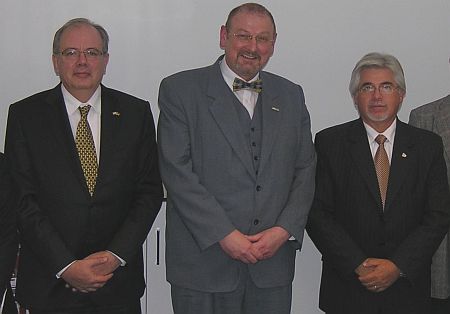Visit of the Uruguayan Agriculture Minister to the BfR

Minister Tabaré Aguerre (right) next to BfR President Professor Andreas Hensel (centre) and Ambassador Alberto Antonio Guani Amarilla (left).
Within the scope of a working visit to Germany, the Minister for Cattle Farming, Agriculture and Fishing, Tabaré Aguerre, was the guest of the German Federal Institute for Risk Assessment (BfR) on 8 February 2013. Together with the Uruguayan ambassador to Germany, Alberto Antonio Guani Amarilla, and other advisers, he gathered information on how to improve and network official structures in the field of food safety and international trade.
Uruguay has a great interest in guaranteeing high standards of food safety. The main focus lies in sustainable production in agriculture and the conservation and management of natural resources. The inter-relationships between the ministry and international organisations, authorities and institutions are to be strengthened on this basis. Another focal point of the work of the ministry lies in the selective and specific expansion of international cooperation with the political and scientific institutions responsible for consumer health protection.
BfR president, Professor Dr. Dr. Andreas Hensel, welcomed the minister along with the BfR staff at the location in Berlin-Jungfernheide. He explained the work of the institute by way of some selected examples. The topics included safety along the food chain, the protection of consumers against pathogens such as Salmonella and Campylobacter, risk communication and alternative methods to experiments with animals. So-called “carry-over” tests, i.e. tests for the transfer of undesired substances and microorganisms from feed to food-producing animals, were explained in detail. These tests are necessary to detect substances which endanger health, such as heavy metals, pesticides and dioxin, as well as zoonosis pathogens such as Salmonella, and they contribute towards an improved risk assessment of undesired substances in foods.
The BfR cooperates in the field of consumer health protection with numerous national and European sister authorities. In this way, a network of authorities and institutions is being built up in the field of food, product and feed safety which connects the national and international levels.
The minister and his entourage showed a keen interest in the scientific work and strategies of the BfR. They inquired in particular about the founding history of the institute as a successor institution of the Imperial Health Office, about the structures of consumer health protection in Germany and about how to ensure the high scientific quality of the work. The BfR Summer School offer, at which scientists come together to deal intensively with and discuss in detail the topics of risk assessment and communication, was very positively received.
Minister Tabaré Aguerre emphasised that good bilateral relations and cooperation agreements with food safety authorities in other countries are of great importance, because food crises do not stop at national frontiers. For the future, he and Professor Hensel agreed to establish technical cooperation to develop efficient structures in the field of food safety, from analysis through risk assessment to risk communication.
